|
Korean and Thai Rotarians donate 3 metric
tons of rice to Father Ray S.O.S. Rice campaign
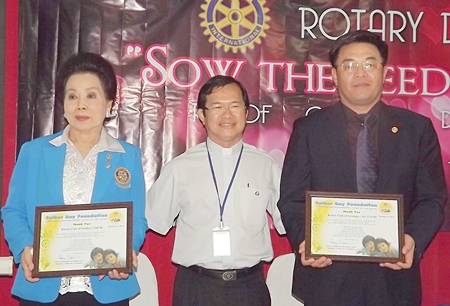
Fr. Michael Picharn Jaiseri (center) presents
thank you certificates to Naree Jintakanon (left) and Lee Young Man (right).
Manoon Makpol
In commemoration of the ‘Rotary, Sow the Seeds of Love
Day’ which falls on February 23 every year, South Korean and Thai Rotarians
donated to the Father Ray Foundation’s S.O.S. Rice campaign while inking a
sister club agreement with each other.
Rotary Governor Elect Lee Young Man of District 3710 in
South Korea, along with a delegation of Rotarians from the Rotary Club of
Gwangju-Bia met up with Past District Governor Thongchai Lortrakanon of
district 3340 and President Naree Jintakanon of the Rotary Club of Chonburi.
The group formed a 50 strong delegation of Rotarians who visited the Pattaya
Redemptorist Center Feb. 16 to present the donation to Father Ray Foundation
acting president, Fr. Peter Pattarapong Srivorakul and vice president, Fr.
Michael Picharn Jaiseri.
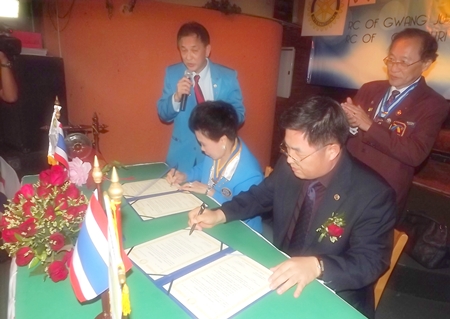
Naree Jintakanon (left) and
Lee Young Man (right) sign a sister club agreement.
The Rotarians donated fifty 60-kg bags of rice worth more
than 100,000 baht. Foundation officials thanked them heartily for the
three-ton donation and treated the guests to a performance from the
wheelchair dance troupe and a wheelchair basketball demonstration by the
students of the Redemptorist School for the Handicapped.
Later that evening Rotarians gathered at the Green Tree
Restaurant for an evening of fellowship and to recommit their agreement to
strengthen their relationship as sister clubs for many years to come.
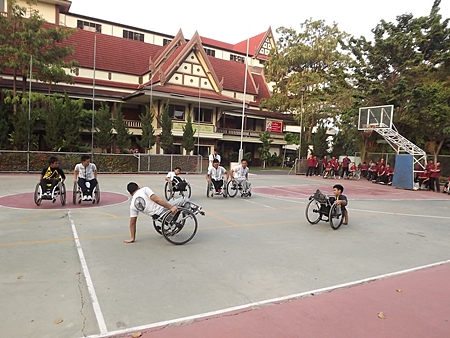
Guests are treated to a
performance from the wheelchair dance troupe.
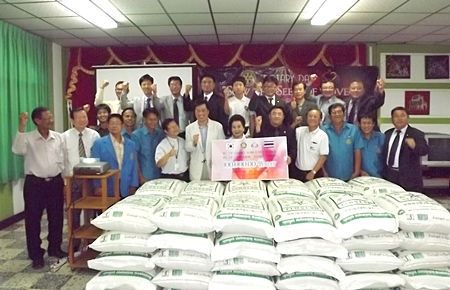
South Korean and Thai
Rotarians donate fifty 60-kg bags of rice to the Father Ray Foundation’s
S.O.S. Rice campaign.
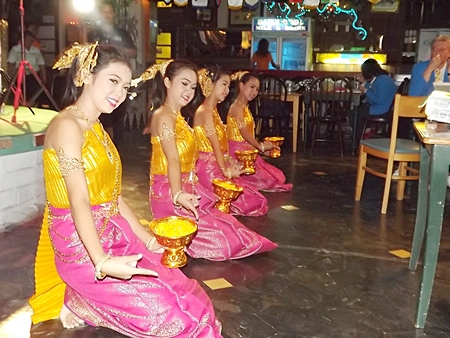
Beautiful Thai dancers give a
cultural performance for the guests at the Green Tree Pub.
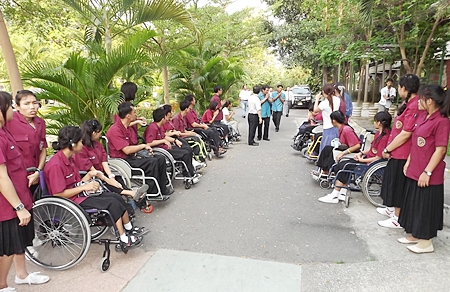
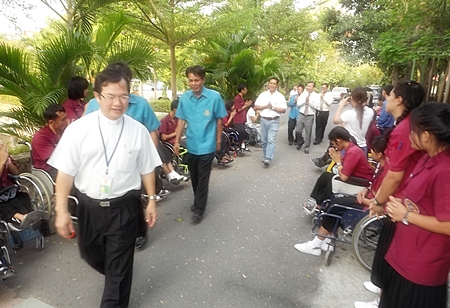
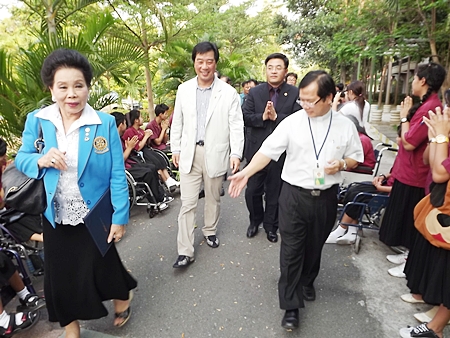
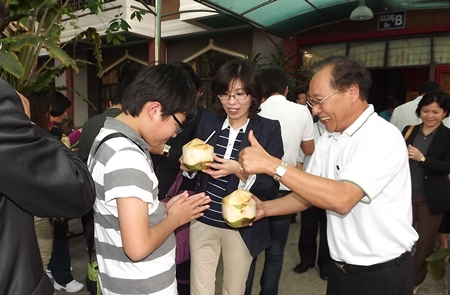
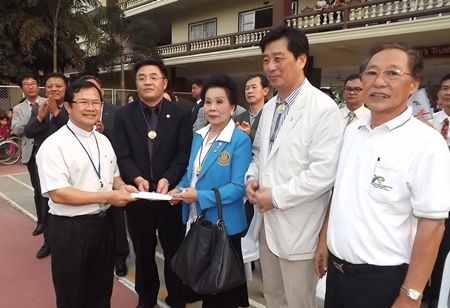
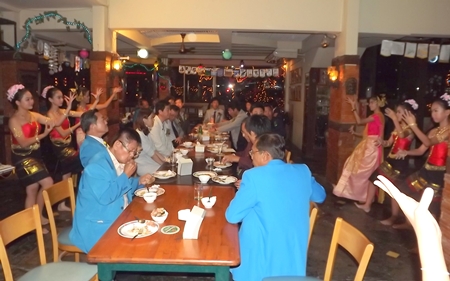
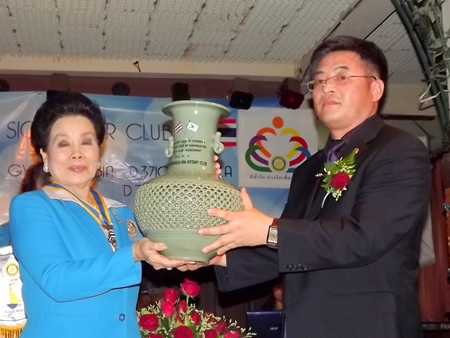
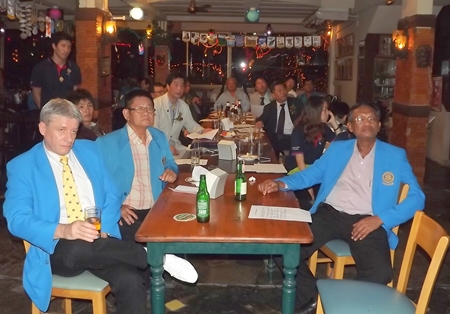
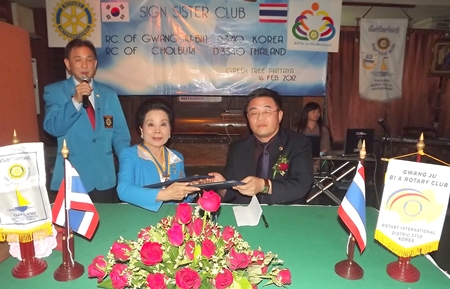
|

|
Cuba has a rich and colorful history
Cuba has a rich and colorful history; this was the message at
the Sunday, February 26 meeting of the Pattaya City Expats Club. Master of
Ceremonies Richard Silverberg called on Linda Cruse to introduce Ivan Sanchez, a
native of this island nation. Ivan is a young man enjoying his first travels
outside of Cuba. He has recently visited India and Nepal and is currently
visiting in Thailand and agreed to tell the Club something about his native
country.
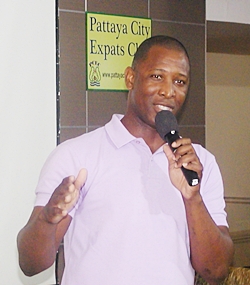
Ivan Sanchez, a native of Cuba,
discusses life & growing up in Cuba under the communist regime. Ivan is enjoying
his first trip outside Cuba, & shared with PCEC members the interesting history
of Cuba from its discovery by Columbus in 1492, to the present day, including
the Cuban missile crisis, and life under Castro.
Ivan began by describing Cuba’s location and summarizing its
history from when it was discovered in 1492 by Christopher Columbus to the
present day. To the north of Cuba is the United States, about 90 miles away; to
the west is the Bahamas and Mexico; to the south is Jamaica and to the southeast
are Haiti and the Dominican Republic. Since Christopher Columbus claimed Cuba
for the Kingdom of Spain it was a colony of Spain for about 400 years. This came
to a close when the Spanish American War ended in 1898. Cuba is well known for
its fine cigars, salsa music, and sugar cane.
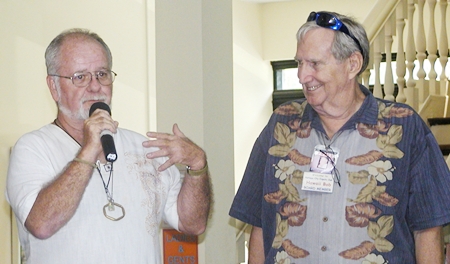
Member Jerry tells PCEC members
of the activities of the Pattaya Friends of Youth, whose aim is to enrich the
lives of many of Pattaya’s less fortunate children. Fishing trips and shopping
trips (for Christmas) are some of the recent activities. Board Member Hawaii Bob
looks on.
Ivan pointed out that in 1511, the first Spanish settlement
was founded at Baracoa and in 1515, the future capital of San Cristobal de la
Habana was founded. At the time Columbus landed on the island, there were two
groups of indigenous Indian people; the Taํno who were farmers and the Ciboney
who were primarily fishermen and hunter-gatherers. The Spanish enslaved most of
the indigenous people, setting them primarily to the task of searching for gold.
Within a century the indigenous people were virtually wiped out. To maintain a
source of labor, the Spanish colonist brought any many slaves from Africa.
After the Spanish American War, Cuba was under the control of
the USA until it was granted independence with restrictions in 1902. Ivan
described the economic situation and culture of Cuba, especially its music. He
mentioned the events that led up to Fidel Castro’s revolution and setting up of
the current Cuban government. Because of the US embargo, Cuba was aided by
several socialist countries. However, with the fall of communism around the
world, this support came to an end in 1991. For several years thereafter, living
conditions in Cuba were horrible. There was a shortage of many items and because
of rampant inflation, what was available was extremely expensive. As an example
he mentioned that they couldn’t even buy soap to bathe with; but with necessity
being the mother of invention, they came up with a plant that could be used
instead. Likewise, they made do with substitutes or did without.
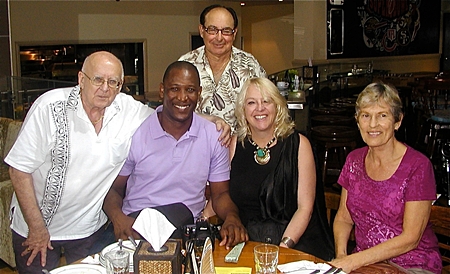
Ivan and his mentor, Linda Cruse
pose with PCEC members Les, Nathan and Pat.
He then explained how this downturn in the Cuban economy led
to the promotion of tourism as a way to obtain needed money. Things in recent
years have improved. Ivan then showed a video called, “Moments in Cuban
History.” It showed many historic places in Cuba as well as Cuban’s going about
their lives and enjoying music and dancing. Of keen interest to many in the
audience were several pictures that showed “vintage” American cars from the late
50’s and during the question and answer period, several in the audience
mentioned how remarkable it was that many looked almost in mint condition.
In response to the question of whether it was difficult for
him to obtain a passport for travel, he responded that it was not so much
difficult as bureaucratic. He said there was a lot of paperwork and many visits
to various offices involved in the process. Further, since passports were issued
by the military, they sent people to where you lived to make inquiries about
you. Although it took time, he was able to obtain his passport and has been
enjoying his time traveling and seeing some of the world, but he does plan to
return to Cuba at the end of his travels as it is his home.
Master of Ceremonies Richard Silverberg called on Roy
Albiston to conduct the always informative Open Forum where questions are
answered about expat living in Thailand, recommendations made about movies and
restaurants, and occasionally the telling of a joke or two. The Pattaya City
Expats Club meets every Sunday at the Amari Orchid’s Tavern by the Sea
Restaurant. Read more about the Club’s activities on their website at
www.pattayacity expatsclub.com.
|

|
German Foreign Office’s state minister visits Thailand
Elfi Seitz
German Foreign Office Minister of State Cornelia Pieper
marked 150 years of diplomatic relations between Germany and Thailand during her
Southeast Asian tour last month.
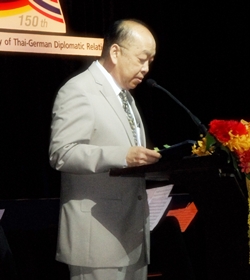
Thailand’s Foreign Minister Dr.
Surapong Towijakchaikul.
Thai Foreign Affairs Minister Surapong Towijakchaikul and
German Ambassador Rolf Schulze were on hand for the Feb. 15 ceremony at the
Foreign Ministry in Bangkok.
“This long-lasting friendship goes back to King
Chulalongkorn, who paved the way for relations,” Pieper said. “He was the first
Thai monarch who visited Germany in 1897 and once more in 1907. On his second
trip, he spent one month in Bad Homburg and there he discovered a mineral spring
which was later named after him. He also presented the town with a Thai-style
pavilion that has graced the spa gardens ever since.”
Pieper noted that Germany has become an important trading
partner for Thailand and had lent its expertise to the kingdom for building of
railroads, postal and telegraph services, as well as medical research,
architecture and library science.
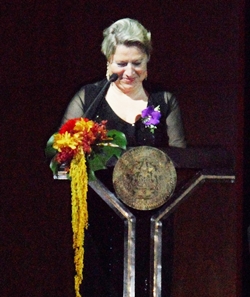
State Minister Cornelia Pieper
delivers her speech.
“More than 500 German companies have settled in Thailand in
sectors spanning chemicals to automobiles to environmental technology,” she
said. Pieper also noted at the more than a half-million Germans visit the
kingdom each year. Thais comprise about 10 percent of Asian visitors to Germany,
she said.
“We plan to continue cooperation between our universities and
will give help in any way,” Pieper pledged, listing the humanitarian and
technical help offered to the kingdom during last year’s flooding crisis.
“Now, on the occasion of this 150-year jubilee, we look back
at our common achievements, but let us also look at the future consolidating the
base of our shared relationships and friendship,” she said.
Following the celebration, Pieper met with Education Minister
Suchart Thadathamrongvej and Culture Minister Sukumol Kunplome, as well as
various German cultural, scientific and economic-cooperation groups.
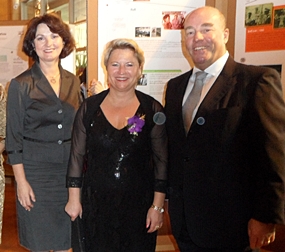
(From right) German Ambassador
Rolf Schulze, State Minister Cornelia Pieper and Petronella Schulze, the wife of
the German ambassador at the reception.
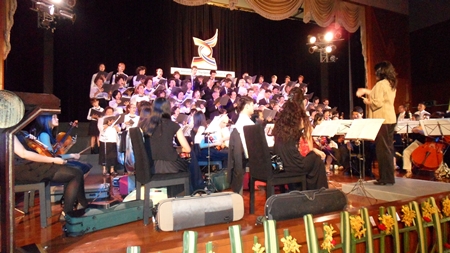
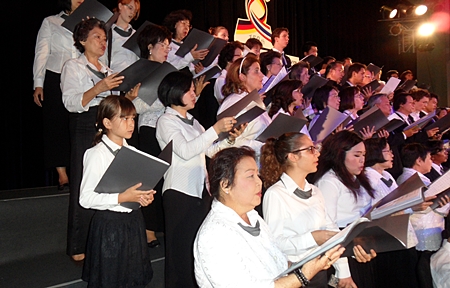
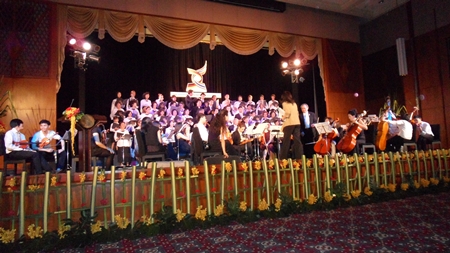
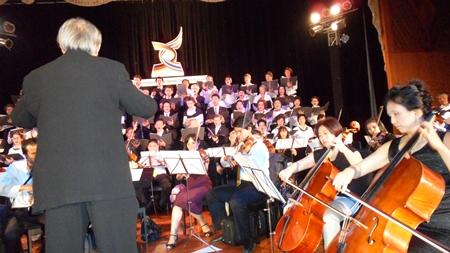
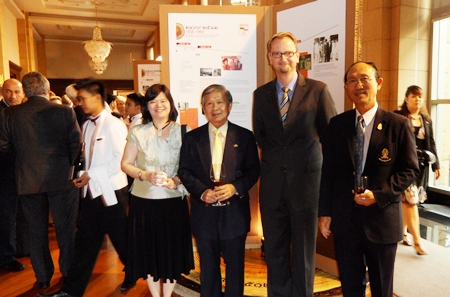
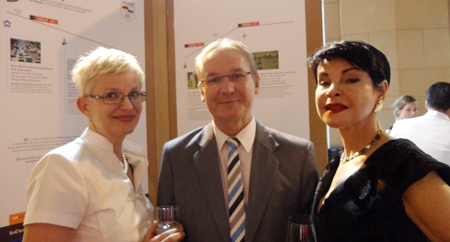
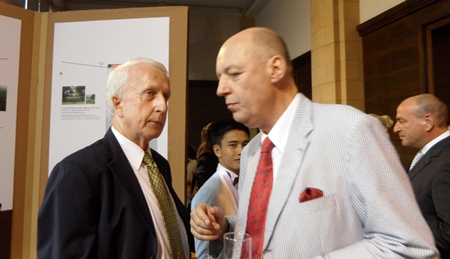
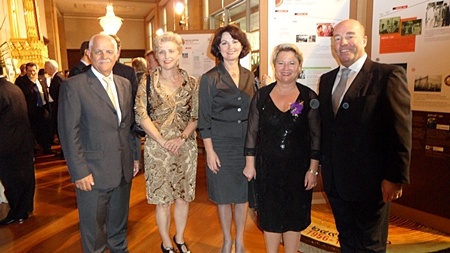
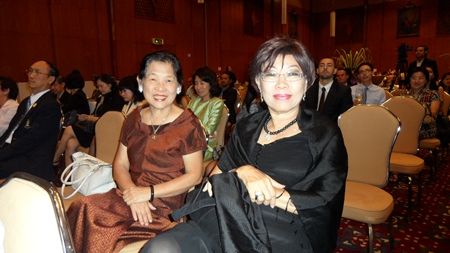
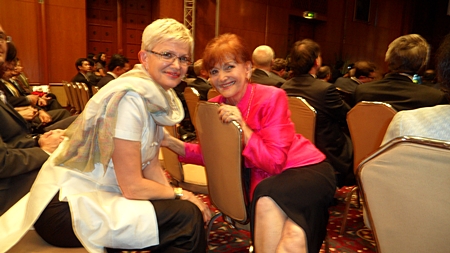
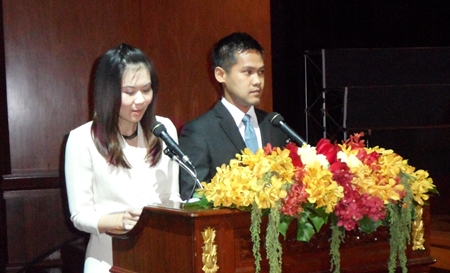
|

|
Ladies Development Group reviews 2011 successes
Plans 2012 activities
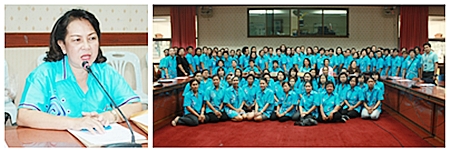
Naowarat Khakhay (inset),
president of Cultural Council and Ladies Development Group leads a meeting of
the nearly 100 members of the group.
Warunya Thongrod
The Pattaya Ladies Development Group plans to continue its
work for the disadvantaged in 2012 with projects ranging from lunch for the
disabled to motivational talks for teens.
At the group’s first meeting of the year, President Naowarat
Khakhay reviewed the group’s success in helping flood victims and the poor in
2011 and set out the agenda for 2012.
She urged members to investigate conditions in their
neighborhood and bring to the club examples of disadvantaged people the Ladies
Development Group could help. Second, she asked for speakers to provide advice
to children entering their teenage years on understanding their parents having a
positive attitude towards life.
Naowarat said the group’s first function of the year will
happen early this month with a luncheon at Karunyawet School for the Disabled.
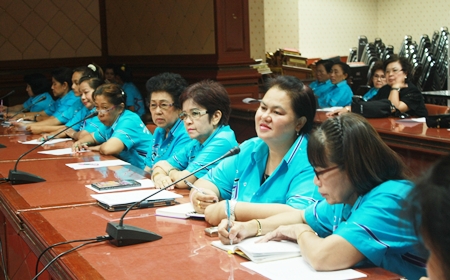
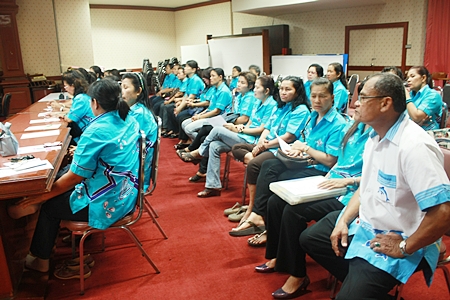
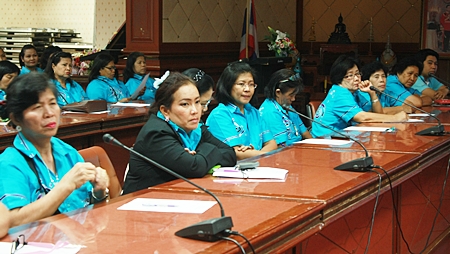
|

